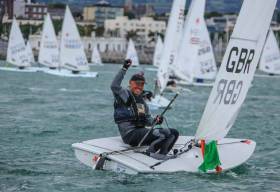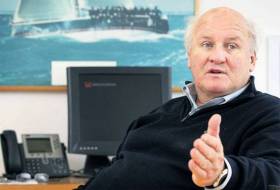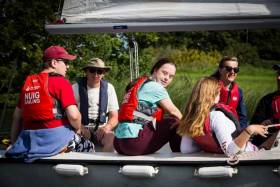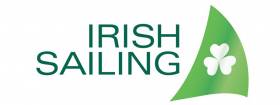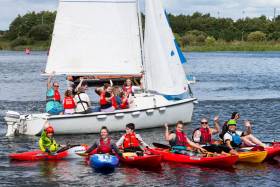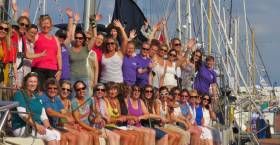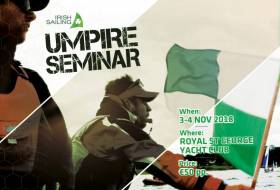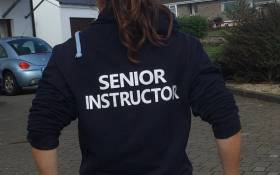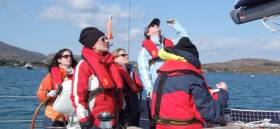Displaying items by tag: Irish Sailing
The winter evenings are dark, Christmas is coming and the long hot summer of 2018 has passed. While personally, I am already looking forward to the 2019 season, there are many sailors still enjoying racing in various winter leagues around the country. Fun sailing at this time of year is proving very popular time for our sport.
Taking up where my last blog left off: In August we hosted the second Watersports Inclusion Games in Galway and I’m delighted that the Games won “Project of the Year” at the Cara National Inclusion Awards.
Our Performance Teams had a successful summer, bringing home three world medals. Robert Dickson and Sean Waddilove won gold at the U23 49er World Championships in Marseilles in September. Liam Glynn took bronze at the U21 Laser World Championships in Gdynia, Poland; and Tom Higgins won silver at the U17 Radial Youth World Championships in Kiel. Both Finn Lynch and Aoife Hopkins made Gold Fleet at the World Championships. Our next chance to qualify for the Olympics is July 2019. Good luck to all involved!
The Performance HQ units, (funded by the Irish Sailing Foundation) arrived at the end of October at their Irish Lights site in Dun Laoghaire and will be fully operational for the Senior and Development teams in the New Year.
The Irish Sailing All Ireland Senior Championship took place in October at Lough Ree Yacht Club. Close racing over two days resulted in the Helmsman’s Silver Salver being won by SB20 nominee and former Olympian Peter Kennedy (Strangford Lough YC). The Junior All Irelands were held a week earlier at the Royal St George YC, and won by Atlee Kohl (RCYC). Watch the videos here on the Irish Sailing YouTube channel: http://bit.ly/2Dxb8jb
Other highlights this summer included the SB20 European Championships held in August in Dun Laoghaire where Michael O’Connor (RStGYC) finished third. The Laser Master World Championships in September saw 301 boats from 25 countries take over Dun Laoghaire for a week. Mark Lyttle finished first in the Grand Master Class. Also competing was Shirley Gilmore, Ireland’s only female competitor. One of our regular “Sailing Hero” articles was dedicated to Shirley here: http://bit.ly/2A89WiY
Some of the projects and programmes will impact sailors. Twenty-three Clubs are actively engaged in our Club Coaching Programme. The response has been very positive and reaffirms our belief that there is a strong cohort of coaches in the country who want to formalise their training and receive the recognition they deserve in the form of official qualification.
We are still pursuing a number of regulatory issues including ICCs, Green Diesel, Small Craft Register, Passenger Boat licencing, and VHF licencing and are we actively engaged on the advisory committee of the Government’s Marine Spatial Planning group.
The Club Symposium in early 2018 hosted by Irish Sailing saw 30 clubs from around the country represented. Discussions centred on social media, communications, marketing, and learnings from individual clubs on their successes and challenges. These discussions resulted in an action plan for Irish Sailing, and we’ve spent time this year implementing changes triggered by this.
The Race Officials Policy Group alongside an active volunteer base ran several courses in all key disciplines of race official management during the year with over 100 attendees. Having qualified specialists in all areas raises the standard of event delivery, which ensures top-class racing for sailors.
Dates for your diary
The Volvo Irish Sailing Awards:
February 8th, RDS, Dublin.
2019 Irish Sailing AGM:
March 30th. Venue tbc.
Colm Barrington Formally Relinquishes Irish Sailing’s Olympic Seat For Patrick Coveney
Colm Barrington has formally stepped down as chair of Irish Sailing’s Olympic Steering Group, as The Irish Times reports.
Greencore chief executive Patrick Coveney will succeed in the role that Barrington announced he would leave after the Rio 2016 games, at which Annalise Murphy won silver for Ireland in the Laser Radial.
Barrington — who says he considers Annalise’s medal win the high point of his 12-year tenure — was elected as first vice president of the Olympic Council of Ireland in February last year.
His successor, brother of Tánaiste Simon Coveney, is no stranger to the water as a member of the Royal Cork Yacht Club. The family previously owned a round-the-word One Tonner, Golden Apple. Coveney was a keen Enterprise dinghy helmsman sailing from Crosshaven in the 1980s.
Barrington told the newspaper that while there is a good system to bring young sailors through to international competition there is "a long way to go".
Not least are the current funding issues facing the new Chairman that led to the recent shut down of the 420 Academy, Optimist squad and Topper squads.
The senior team has also been refocussing with just under 600 days to Tokyo 2020 where Irish boats have yet to qualify.
Irish Sailing wins CARA Inclusion Award
The second annual Watersports Inclusion Games, organised by Irish Sailing, won Project of the Year at the National Inclusion Awards last night hosted by CARA and Sport Ireland.
The National Inclusion Awards highlight the excellent work of people and organisations who enhance participation opportunities for people with disabilities in Sport and Physical Activity.
A delighted Johanne Murphy, Irish Sailing Watersports Inclusion Games Officer commented: “this is a tremendous achievement and is down to the amazing committee and awesome volunteer team that we had at the event, and of course our wonderful participants”.
Three watersports national governing bodies (Canoeing Ireland, Rowing Ireland and Irish Sailing) and partner organisations came together to put on the Games, which are now an annual event attracting people from all abilities on the physical, sensory, intellectual and learning difficulty spectrums. The two-day event aims to show both participants and their families, as well as people who organise watersport events, that everyone can get out onto the water.
Next year’s Watersports Inclusion Games will be held in Cork, so watch out for more details on the Irish Sailing website. Watch the Watersports Inclusion Games on the Irish Sailing YouTube channel here
Irish Sailing was also awarded the Irish Water Safety Award for Community and Social Responsibility yesterday in recognition of the support given to Irish Water Safety Community Work.
Small Craft Register: Irish Sailing Wants To Hear From You
Earlier this summer Irish Sailing asked boat owners for their experiences of sailing their boats abroad, registering on the Department of Transport, Tourism and Sport’s Part 1 Register, registering with other flag states and more.
Now the governing body for sailing in Ireland is requesting a meeting with the department and would like to ensure that its members’ collective voice is heard.
Irish Sailing says it has been representing the interests of its membership in representations to the department on a number of occasions in the past, campaigning for a statutory small craft register to be established for recreational craft travelling abroad.
“A registration system that is voluntary, appropriate, accessible, affordable and easy to obtain, as exists in many other European states” is what Irish Sailing is advocating for.
The department committed in the Maritime Safety Strategy 2015-2019 to start work on developing such a registration system in 2017 and encourage recreational craft under 24m to register in 2018. However, there is still no sign of it.
Irish Sailing says it has been told firmly that in the interim the current Part 1 register used for commercial shipping is available and fit for purpose for recreational craft, which is contrary to anecdotal feedback it has received to date from boat owners.
To be part of this representation, please share your experience directly by email to [email protected] before next Tuesday 20 November.
Inclusion in Sailing Features in National Inclusion Awards 2018
There are three sailing finalists in the 2018 Cara National Inclusion Awards and confirms that sailing really is a “Sport for All”.
Irish Sailing’s incredibly successful Watersports Inclusion Games, hosted in Galway this year, is a finalist for the 2018 Project of the Year.
East coast club, Bray Sailing Club have been shortlisted for 2018 Best Inclusive Club of the Year and Sail Training Ireland for Youth Development in the Adventure category.
In 2015 Irish Sailing was awarded Best Inclusive National Governing Body and in 2017 Donal Hickey of Kinsale Yacht Club and Sailability won Volunteer of the year for his region.
Full 2018 nomination details are here.
Irish Sailing currently awaits formal approval for Watersports Inclusion Games for 2019. The Association plans to build on the success of the past events and their focus for 2019 is making sailing available for all and clubs including supporting volunteers to facilitate sharing the joys of sailing.
If you would like to find out more about inclusion in sailing then you can contact Irish Sailing National Inclusion Officer, Ciarán Murphy, on [email protected]
Royal Cork To Host 2019 Youth Sailing Pathway Nationals
#YouthSailing - The Royal Cork Yacht Club will host next year’s Irish Sailing Youth Pathway Championships, it has been announced.
The dates to save are 25-28 April 2019 when Ireland’s largest youth regatta comes to the world’s oldest yacht club.
It is also Irish Sailing’s primary talent-spotting event of the year — so is a must for budding high performance sailors looking to match the performance of Tralee Bay’s Justin Lucas at this year’s championships.
Irish Sailing is seeking expression of interest from Irish sailing clubs to host the inaugural Women at the Helm Regatta next summer, as well as subsequent events in 2020 and 2021.
The debut regatta is set for two days in August for women with their own dinghies for PY sailing, as well as a keelboat competition.
More than 100 participants from age 14 up are expected to take part in the inaugural event.
“There has been tremendous interest in attending this event nationally and is set to be a fantastic celebration of women’s sailing and a great opportunity to encourage more women to take the helm,” Irish Sailing says.
Clubs with an interest in hosting the event are invited to contact Gail MacAllister at [email protected].
Irish Sailing To Host Umpire Seminar Next Month
Mark the first weekend in November on your calendar for Irish Sailing’s upcoming seminar for prospective race umpires.
The two-day course on Saturday 3 and Sunday 4 November at the Royal St George in Dun Laoghaire provides the first step towards gaining an Irish Sailing race umpire qualification.
Guided by instructors Chris Lindsay and Cxema Pico, you will be introduced to the basics of team race umpiring, as well as how to make decisions in real time on the water, and will cover the relevant theory to apply.
Those who feel ready will also have an opportunity to sit the National Umpire exam — while all will be invited to the Irish Team Racing Nationals on 17-18 November to put what they’ve gleaned from the seminar into practice.
No previous experience as an umpire is required or this course, but a powerboat certificate (for piloting RIBs) and VHF licence are required, and experience or knowledge of team racing would be helpful.
More details are available from the Facebook event page HERE.
Irish Sailing’s Cork-Based Senior Instructor Course Rescheduled
Irish Sailing’s Cork-based course for senior instructors has been rescheduled for two weekends in Oysterhaven this November.
The course will now run on Friday 2 to Sunday 4 and Friday 9 to Sunday 11 November, with the Friday session each weekend running in the evenings from 5pm to 9pm.
Booking for the Cork senior instructor course is open till Friday 19 October and the fee is €330.
Full details on the course are available from the Irish Sailing website.
Learn To Be A Competent Crew Or Day Skipper In West Cork This October Bank Holiday
#HowToSail - Looking to escape to the sea and learn the ropes of how to crew or be a day skipper offshore?
This October Bank Holiday weekend, the West Cork Sailing and Powerboating Centre will host five days of clinics from Saturday 27 to Wednesday 31 October, organised by Wild Atlantic Wildlife in tandem with Bantry Bay Sailing Club and sailed on the 37ft Jessy of Adrigole.
The competent crew introductory course is for those looking to experience being at the elm, helping with the sails, dealing with ropes, learning about being safe on the water and generally being a useful hand on deck.
For more advanced sailors with at least five days on a yacht (100 nautical miles and four-plus night hours), the Irish Sailing Day Skipper practical certification course will be more useful — designed to teach you to take charge safely and confidently.
Spaces are limited for these courses, priced at €500 saying or €800 solo in your own private cabin. The cost includes foul weather gear and lifejacket (you’ll have to bring our own footwear, sleeping bag and pillow), mooring and marina fees, fuel, breakfast and lunch, and one evening meal aboard.
For more details see the Wild Atlantic Wildlife website HERE.


























